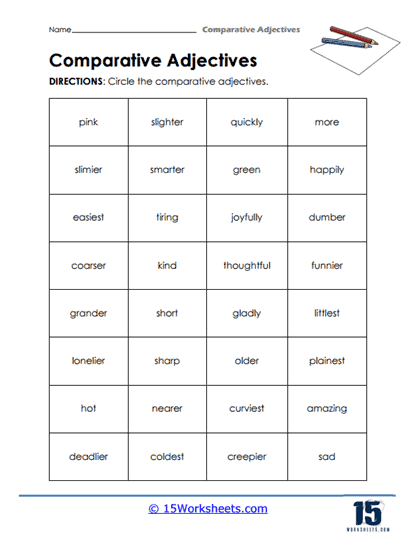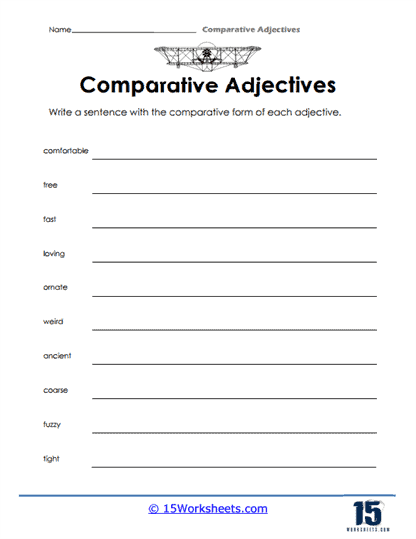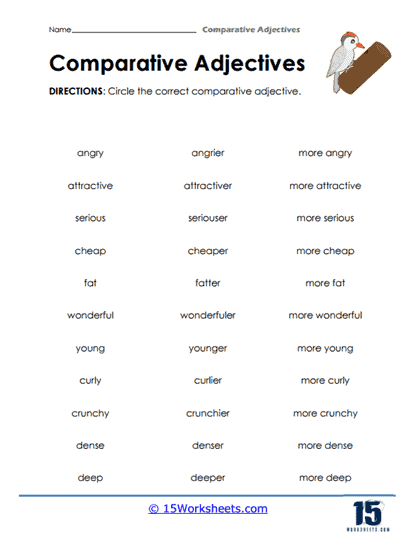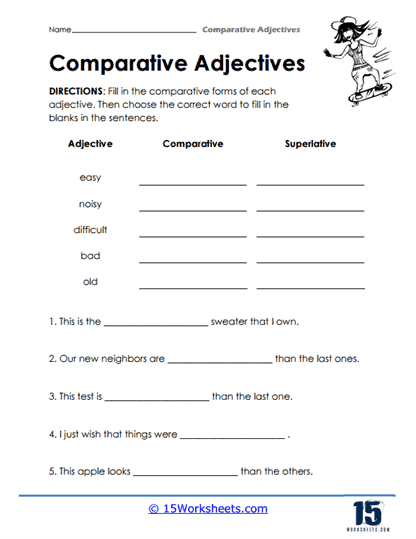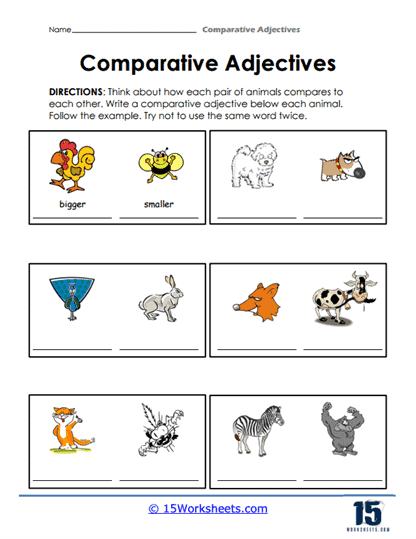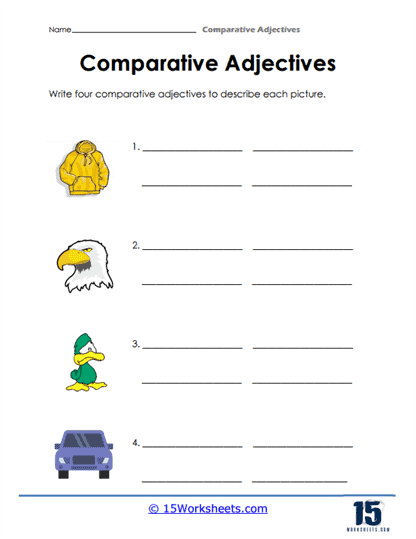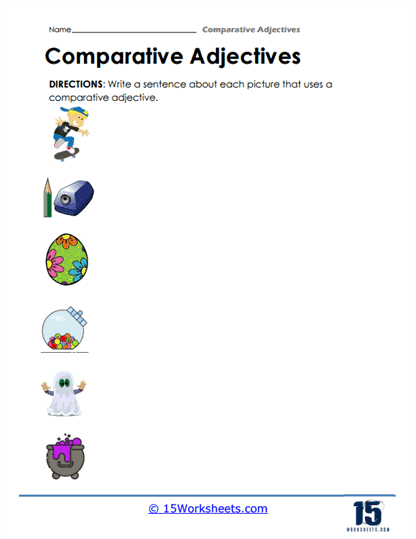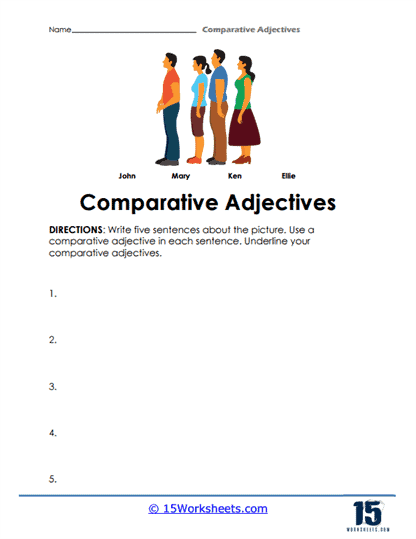Comparative Adjectives Worksheets
All About These 15 Worksheets
These Comparative Adjectives worksheets help students learn all about comparative adjectives and how to use them correctly in sentences. The worksheets typically begin with an introduction to the definition of comparative adjectives, including examples of common comparative adjectives and their usage. This will guide the students in identifying them in sentences.
Spot the Comparative Adjective invites students to become linguistic detectives, scanning sentences to identify the sneaky adjectives that compare. It’s like a game of “Where’s Waldo?” but with words. Then, Sentence Synthesis challenges learners to merge simple sentences into complex ones, using comparative adjectives as the glue. It’s sentence alchemy at its finest.
In Creating Comparative Forms, students morph base adjectives into their comparative counterparts, turning “fast” into “faster” and “happy” into “happier.” It’s a magical transformation that would make any wizard proud. What’s the Opposite? flips the script, prompting learners to find antonyms and then compare them, like pitting “hot” against “cold” in a thermal tug-of-war.
Transforming Adjectives takes it up a notch, encouraging students to convert adjectives into their comparative forms and use them in context. It’s like giving adjectives a makeover and then sending them on a date. Comparison Word Search adds a playful twist, hiding comparative adjectives in a grid, turning the quest into a treasure hunt for word enthusiasts.
With Find And Use, students locate comparative adjectives and then craft sentences around them, weaving tales of taller giraffes and faster cheetahs. Adjective Fit is the fashion show of grammar, where adjectives strut their stuff, and students decide which fits best in a sentence ensemble.
Constructing Sentences is the building block challenge, where learners assemble sentences using comparative adjectives, constructing grammatical skyscrapers. Circle the Correct Form is the multiple-choice arena, where students choose the right comparative form, battling the ever-confusing “more fun” vs. “funner” dilemma.
Using Comparative and Superlative Forms expands the horizon, guiding students through the gradation of adjectives, from “fast” to “faster” to “fastest,” like a linguistic Olympic podium. Creatures in Contrast brings in the animal kingdom, comparing beasts in a zoological showdown-who’s fiercer, the lion or the tiger?
Picture Analysis turns art critic, asking students to describe images using comparative adjectives, blending visual literacy with grammar. Descriptive Comparisons dives into the nuances, encouraging learners to craft sentences that paint vivid pictures, comparing sunsets, ice creams, and roller coasters.
Finally, Comparative Adjective Showcase is the grand finale, a stage where students display their mastery, crafting compelling comparisons that dazzle and delight. It’s the grammar gala, and everyone’s invited.
In this collection, comparative adjectives aren’t just grammatical tools-they’re characters in a grand narrative, each worksheet a chapter in the epic tale of language learning. So grab your pencil, don your thinking cap, and dive into the most entertaining grammar adventure this side of the dictionary!
What are Comparative Adjectives?
Comparative adjectives are a type of adjective that is used to compare two nouns or pronouns. They are used to show the difference in degree or quality between two things, people, or ideas. In English grammar, comparative adjectives are formed by adding “-er” to the end of the adjective or by using the words “more” or “less” before the adjective.
For example:
- She is taller than her sister. (taller is the comparative form of the adjective “tall”)
- This book is more interesting than that one. (more interesting is the comparative form of the adjective “interesting”)
Comparative adjectives can also be used with “than” to indicate the noun or pronoun being compared. In this case, the noun or pronoun being compared is placed after “than.”
For example:
- He is smarter than his brother.
- This car is faster than that one.
It is important to note that some adjectives have irregular comparative forms, such as “good” (better) and “bad” (worse).
Comparative adjectives are commonly used in English to make comparisons between two things, people, or ideas. They are essential for effective communication and can help to make language more descriptive and precise.
Using Comparative Adjectives For Deeper Reader Impact
Using comparative adjectives in writing is a powerful stylistic tool that enhances the reader’s understanding and emotional engagement by establishing relationships between two or more elements. A comparative adjective describes the difference in degree between two things, typically ending in “-er” (e.g., smarter, braver, darker) or using “more” or “less” before adjectives that are longer or more complex (e.g., more effective, less interesting). When used thoughtfully, these comparisons help writers highlight contrasts, demonstrate progress, or express subtle shades of meaning, making descriptions and arguments more vivid and persuasive.
For instance, in narrative writing or storytelling, comparative adjectives can create tension or emphasize character development. Consider the sentence: “John was braver than he had ever been before.” This not only shows bravery but implies a past struggle or growth, making the character more compelling. In descriptive passages, saying “the night grew colder than the one before” invites readers to sense a deepening of the atmosphere, evoking emotion and setting a richer tone. The comparisons draw readers into a deeper engagement with the text, as they’re invited to visualize and weigh the differences being described.
In persuasive and analytical writing, comparative adjectives can sharpen arguments by clearly positioning one idea, object, or viewpoint against another. For example, writing that one solution is more efficient than another directly supports an argument and pushes readers to consider the reasoning behind that assertion. It allows for nuanced expression, showing degrees of difference rather than making absolute claims, which can sound overly simplistic or dogmatic. By layering your writing with such degrees, you make your points not only clearer but also more credible and resonant with readers who value balanced and thoughtful insights.






